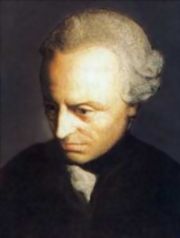Immanuel Kant
| This page or section needs work. |
Suggested Socionics type: LII (TiNe, INTj)
Contents |
Brief Biography
Personal Statements
About
Type Arguments
Argument For LII:
Kant is known as the father of idealism, which in philosophy refers to the notion that ideas generate the material world (the philosophical antonym of an idealist is a materialist, of which Karl Marx was one.) Another famous idealist, known for his incorruptibility, was Robbespierre, the nickname of the LII. Kant's categorical imperative (an absolute command that had to be obeyed all the time, every time) never factored in personal benefit; the categorical imperative was carried out regardless of whether it benefitted you, harmed you, or did not affect you whatsoever. It was not affected by what anybody or anything except for logic. The categorical imperative was strictly a matter of duty, not happiness or reward. These qualities highlight two aspects of Kant's character: his complete embrace of ideas and intuition (along with his rejection of all things sensing), and his introverted rational temperament, which valued duty, the restriction of impulsiveness and personal independence, and lead to a systematic conception of how the whole world should function.
Kant had a deep-seated belief in reason. Reason alone was the end-all answer to all moral questions. He thought that all people could become reasonable (governed by reason), that they could do this independently and of their own free will, and that they would all arrive at one Reason (that reason was a universal concept). Violations of reason were not just taken seriously by Kant; he completely denied their validity.
For example, Kant wrote an essay on how government should work. Kant believed in the social contract theory (that all people, including the governors, made a pact delegating powers and responsibilities), but Kant's twist was that the social contract could never under any circumstances be violated, even if the rulers/governors had violated it and overstepped their authority. In an exquisite example of Kant's thought, the citizens in such a case had a duty to protest the violation of the contract, but this protest could never turn into a revolt and a new social contract could never be forged because this would mean that the original social contract was not governed by reason.
Aside from this example, any of Kant's works are littered with examples of his ![]() Ego. He lived and breathed
Ego. He lived and breathed ![]() . It is even in Kant's German grammar, which, in an age where grammar was difficult and philosophical works had especially convoluted sentence structure, is a mythical labyrynth that has to be navigated through.
. It is even in Kant's German grammar, which, in an age where grammar was difficult and philosophical works had especially convoluted sentence structure, is a mythical labyrynth that has to be navigated through.
There are two major issues with Kant's typing of LII. One, his absolutism might make him seem favorable to ![]() , but it is a mistake to say that
, but it is a mistake to say that ![]() represents absolutism and
represents absolutism and ![]() does not. Kant's hardline stance is actually an attempt to ignore
does not. Kant's hardline stance is actually an attempt to ignore ![]() -matters, such as how his theories would be applied outside of theory. If ideas cause reality, reality can be changed by never doubting an idea.
-matters, such as how his theories would be applied outside of theory. If ideas cause reality, reality can be changed by never doubting an idea.
Two, Kant's writing has one major focus: morality. However, Kant's approach to morality is purely logical; Kant basically equates "what is right" with "what is logical," "logical" for him being constant and universal once applied. Kant's attempt to create a purely logical moral theory was in opposition to Christianity's traditional authority in the subject.
Alternative Typings
Alternative suggested socionics types: ILI, ILE
Typings at SSS database: Immanuel Kant
Suggested enneagram variants: 5, 6
